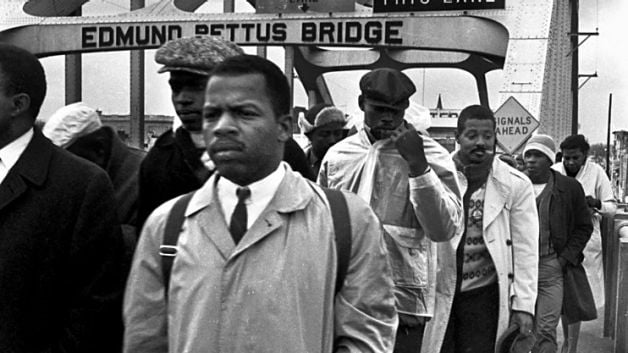On March 7, 1965, Student Nonviolent Coordinating Committee (SNCC) Chairman John Lewis led hundreds of activists across the Edmund Pettus Bridge in a march for voting rights for people of color. They were met at the end of the bridge by a wall of state troopers, who proceeded to attack the marchers with nightsticks, tear gas, and officers on horseback. The brutal images of police violence on “Bloody Sunday” sparked a national outcry, as many protesters were left severely injured. Lewis received a skull fracture and bore scars on his head that stayed for the rest of his life.

Yet Lewis kept fighting, and his efforts were crucial in passing the Voting Rights Act of 1965. He remained a prominent civil rights activist throughout his life and later became a Congressman in Georgia. Until his death last July, John Lewis encouraged people to “get in good trouble” in the fight for equity and justice for all.
Lewis’ legacy is in jeopardy today. In its 2013 decision in Shelby County v. Holder, the Supreme Court gutted the Voting Rights Act by eliminating the sections requiring states with a history of voter discrimination to receive “preclearance” (federal approval) before making any change to voting practices that might affect minority voters. Thus states that had historically discriminated in their voting practices were given carte blanche to do so again.
And they have. Right now across the country, state legislatures are introducing and passing hundreds of bills designed to suppress voting, particularly among communities of color. To combat these assaults on our democracy, Congress must take action at the federal level.
Earlier this month, the House passed the John Lewis Voting Rights Advancement Act (HR4), a bill designed to restore the power of the Voting Rights Act. The legislation would supersede the voter suppression laws passed in states like Georgia, Florida, and Texas that inevitably target voters of color in and around major cities.
“Old battles have become new again,” said Alabama Rep. Terri Sewell, the bill’s lead sponsor. “I want you to know that the modern-day barriers to voting are no less pernicious than those literacy tests and those poll taxes. And what we must do, as we did back in the ’60s, is when we see states running amok, we need federal oversight.”
HR4 now faces an uphill battle in the Senate.
Call your Senators at (202) 224-3121 or (202) 224-3091 (TTY) and urge them to pass the John Lewis Voting Rights Act! It’s time to stop the decades-long attack on voting rights once and for all!
Don’t forget to show your support for voting rights legislation by stamping your bills!
